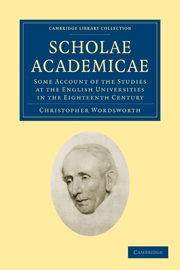 Scholae Academicae
Scholae Academicae Book contents
- Frontmatter
- PREFACE
- Contents
- CHAPTER I GENERAL INTRODUCTION
- CHAPTER II THE TRIPOS, name and thing
- CHAPTER III THE SOPHS' SCHOOLS before 1765
- CHAPTER IV ACTS AND OPPONENCIES after 1772
- CHAPTER V THE SENATE-HOUSE
- CHAPTER VI THE ADMISSION OF QUESTIONISTS. Huddling
- CHAPTER VII THE MATHEMATICKS
- CHAPTER VIII THE TRIVIAL ARTS
- CHAPTER IX HUMANITY
- CHAPTER X MORALS AND CASUISTRY
- CHAPTER XI LAW
- CHAPTER XII MODERN STUDIES
- CHAPTER XIII ORIENTAL STUDIES
- CHAPTER XIV PHYSICK
- CHAPTER XV ANATOMY
- CHAPTER XVI CHEMISTRY
- CHAPTER XVII GEOLOGY AND MINERALOGY
- CHAPTER XVIII BOTANY
- CHAPTER XIX The Degree of M.A.
- CHAPTER XX MUSICK
- CHAPTER XXI ASTRONOMY
- CHAPTER XXII CONCLUSION
- APPENDICES
- INDEX
CHAPTER IV - ACTS AND OPPONENCIES after 1772
Published online by Cambridge University Press: 07 September 2010
- Frontmatter
- PREFACE
- Contents
- CHAPTER I GENERAL INTRODUCTION
- CHAPTER II THE TRIPOS, name and thing
- CHAPTER III THE SOPHS' SCHOOLS before 1765
- CHAPTER IV ACTS AND OPPONENCIES after 1772
- CHAPTER V THE SENATE-HOUSE
- CHAPTER VI THE ADMISSION OF QUESTIONISTS. Huddling
- CHAPTER VII THE MATHEMATICKS
- CHAPTER VIII THE TRIVIAL ARTS
- CHAPTER IX HUMANITY
- CHAPTER X MORALS AND CASUISTRY
- CHAPTER XI LAW
- CHAPTER XII MODERN STUDIES
- CHAPTER XIII ORIENTAL STUDIES
- CHAPTER XIV PHYSICK
- CHAPTER XV ANATOMY
- CHAPTER XVI CHEMISTRY
- CHAPTER XVII GEOLOGY AND MINERALOGY
- CHAPTER XVIII BOTANY
- CHAPTER XIX The Degree of M.A.
- CHAPTER XX MUSICK
- CHAPTER XXI ASTRONOMY
- CHAPTER XXII CONCLUSION
- APPENDICES
- INDEX
Summary
‘See Gray, so used to melt the tender eyes,
Stretch'd on the orbit of a circle dies!
And Goldsmith, whom deserted Auburn haled,
See on a pointed triangle impaled!
And to encrease their torment, while they're rackt
Two undergraduate Devils keep an act:
Who stun their ears with Segments and Equations.
Moons horizontal, Tangents, and Vibrations,
And all the jargon of your schools they're pat in;
Bating they speak a little better Latin.’
The Academick Dream (1774), p. 14.In the early part of the eighteenth century the examination for degrees was not in all cases adequate to the measure of knowledge or to the capacity of the candidates.
In 1731, just after the new senate-house was in use, the exercises of sophisters and questionists were ordered to be performed in the Lent term on the same days and in the same form as in the terms after Easter and Michaelmas. Lent term ‘for many years had been a time of disorder by reason of divers undue Liberties taken by the younger Scholars, an Evil that had been much complained of; and all Exercise had either been neglected or performed in a trifling ludicrous manner.’
Fifty years later we find this trifling (so far as the degree of B.A. was concerned) confined only to the ‘huddling,’ which was done (as will be seen in due course) after a fair, though not fully statutable, modicum of solemn exercises and examinations.
- Type
- Chapter
- Information
- Scholae AcademicaeSome Account of the Studies at the English Universities in the Eighteenth Century, pp. 32 - 43Publisher: Cambridge University PressPrint publication year: 2009First published in: 1877
